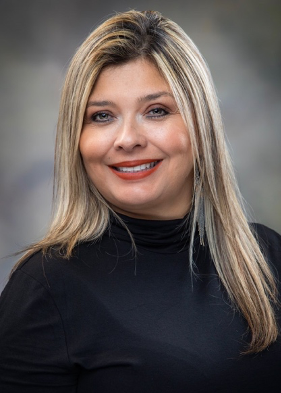Faculty Spotlight: Diana M. Cavazos, Ph.D., MSN, RN

 1) Please tell me about yourself.
1) Please tell me about yourself.
I was born in Laredo, Texas and I was raised going back and forth to the border town of Reynosa, Mexico where I completed my first nine years of school. This allowed me to grow up knowing the American culture and the Mexican culture at the same time. I completed high school in Laredo, Texas and moved to the Rio Grande Valley to complete a Surgical Technology program at a technical college in Harlingen. Life took me to Florida where I completed my associate’s degree before moving to Puerto Rico in 1993. What was meant to be a 6-month stay ended up being a 20-year journey where I was able to grow academically, professionally and personally. I completed my BSN, MSN, MHSA degrees and I met some of the most amazing people while residing in Puerto Rico. I lived the best and worst moments of my life in the enchanted island. After traveling the world to learn from different cultures and to serve in medical brigades, I returned to Texas in 2012 where I started the journey into my doctoral education and the search for professional growth.
2) What brought you to UT Health San Antonio?
I had been looking to be part of an academic institution that would support my professional growth while allowing me to continue serving my community. UT Health San Antonio is well known for its involvement with the community through research and outreach programs, therefore, becoming part of the School of Nursing faculty became a priceless career opportunity. UT not only supports my research goals and planned projects but my peers are exceptional nurses, truly amazing individuals who are caring and supportive.
3) Tell me about your research interests and why you are passionate about this topic?
I am interested in continuing to do research to study programs and interventions that empower women victims of intimate partner violence to break away from violent relationships. I am passionate about this topic because it has become a lifelong quest and I strongly believe that individualized interventions can help victims successfully and safely leave violent intimate partners.
I have recently started research to study issues related to language access for limited English proficiency patients, specifically patients who only speak Spanish, and the interactions of Spanish speaking nursing students with these patients. I am very passionate about this topic because as previous studies have demonstrated that patients with limited English proficiency experience disparities in the access to and quality and safety of medical care, I strongly believe that we can find valuable resources in Spanish speaking student nurses; with adequate training to improve their medical Spanish proficiency, bilingual nursing students who speak Spanish are able to communicate effectively with these patients, helping the healthcare system close the communication breach that affects the healthcare community.
4) What do you want the public to know about your research? Why is your topic important?
On intimate partner violence…
The public needs to know that the phenomenon of violence against women is very much alive in San Antonio. Currently, Bexar county’s rates of intimate partner violence against women exceed those rates in Houston and Dallas. From 2012 to 2017, the number of women killed by male intimate partners more than tripled in Bexar county. Because there is no evidence that the factors most often linked to domestic violence are present in San Antonio more than elsewhere in the state, it is important to study how women can be realistically empowered to breakaway from this type of relationships. This topic is important because as victimization continues it will continue to affect our society as a public health problem. As Healthy People 2020 has established a developmental objective to reduce violence by intimate partners, our efforts can contribute to meet this objective.
On limited English proficiency (LEP) clients…
The public needs to know that out of 16 million people in the U.S. that also speak Spanish at home, about 9 million report that they do not speak English well, or at all (limited English proficiency). While Texas is one of the states with higher concentrations of Spanish-only speaking citizens, it is evident that these patients are now encountered in nearly every healthcare system in the state. Title VI of the Civil Rights Act of 1964 requires facilities that receive federal financial assistance to take reasonable steps to make their programs, services, and activities accessible to limited English proficiency individuals. While LEP patients struggle to navigate the health care systems and struggle to communicate effectively with their healthcare providers, adverse events affect them more frequently and are more likely to result in serious harm compared to those that affect English-speaking patients; this also increases the difficulty in providing high-quality care and the liability of healthcare facilities and their providers.
This topic is important because healthcare facilities are responding to the growing awareness of the clinical and legal implications of language barriers, struggling to meet the needs of the LEP patients they serve. As health care systems are increasingly testing their bilingual staff, it has been discovered that many of them have only basic language skills and are not adequately prepared for the complex communication of a medical encounter. Preparing bilingual student nurses to improve and enhance their medical Spanish proficiency prepares these future nurses to significantly improve interactions with LEP patients, becoming a valuable resource to hospitals and other health care organizations. Trained bilingual nurses can offer a critical set of skills to interact with individuals who require care in a language other than English, helping provide high-quality health care and improving patient safety.
5) What is your favorite part of your job?

Being able to share my passion for the nursing profession with faculty and students is probably my favorite part of the job. Having the academic freedom to adapt to nursing students diverse learning needs makes my job really enjoyable.
6) What is the most challenging part of your job?
Meeting all organizational and administrative processes, although essential, is probably the most challenging part of my job.
7) What do you like most about mentoring students?
I truly enjoy watching students evolve into caring professionals.Watching students get excited when they master a nursing skill, join a professional organization, participate in a challenging activity or pass a crucial exam is truly rewarding.
8) How do you like to spend your free time?

I enjoy traveling, mostly to another country to explore different cultural experiences. Nevertheless, the beach is where I like to spend my free time.
9) What is the most helpful advice you’ve received?
I was once told “You can somehow force someone to do something, but you can NEVER force anyone to feel anything.” Best advice ever…and I use it often to understand people’s behavior.
